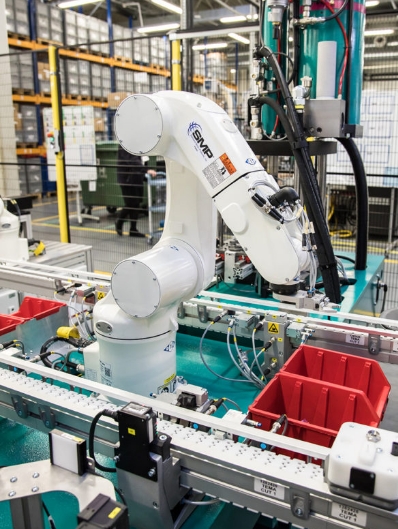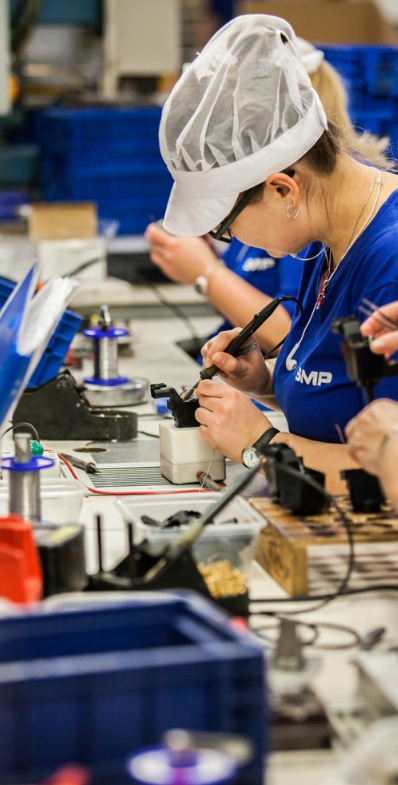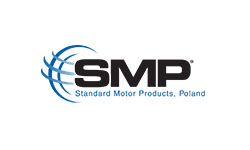
SMP Poland
Implementation objective: automation of processes and digitisation of paper-based invoice workflows
Solution: electronic cost and goods invoice workflow system with OCR service for foreign language invoices, in conjunction with PZ document register, digital IE599 message register. Integration with the financial and accounting system JD Edwards
SMP Poland is part of the New York-based multinational Standard Motor Products Inc. which is a leading manufacturer, distributor and retailer of automotive replacement parts in the primary and aftermarket.
We have been present in Poland since 2006. In Bialystok, we operate a plant specialising in the design and manufacture of coils, sensors and switches for the automotive industry. The manufactured products are used in cars, trucks, construction and agricultural machinery and heavy equipment. Hence, we export them to, among others: USA, Italy, Germany, UK, China, India and many other countries.
The production activity, is based on the import of components, and finished goods are exported to contractors. Consequently, a large number of different types of documents are processed and handled within the company. Invoices are a particular challenge, but so are documents related to the sale and purchase of goods, such as proformas, customs notes (including IE599 messages) or claim notes.

“In the system, we can easily control payment deadlines, verify unwanted errors and, above all, we have moved away from manual work at many stages of working with an invoice.”

Chief Financial Officer at SMP Poland
Anna Korytko
Challenge, analysis of the Company’s situation
Handling financial documents meant high time-consumption due to the number, as well as complex approval processes on the management side. Some documents required detailed verification for expected irregularities.
Data processing and process handling used traditional tools based on emails and paper documents. This approach was challenging in organisational terms, required a significant time commitment from staff and entailed costs for the company.
The export activity of a company involves the receipt of specific documents. These include customs messages transmitted as an xml file. The difficulty has been processing them and linking them to invoices.
Automation of tasks when working with documents should have been introduced. Apply a system shot and do away with manual data verification on documents.

Digitisation of the financial area
The invoice workflow process in the V-Desk System allows the document to be prepared, enabling ready-made payment files to be generated for banking systems.
Invoices, customs notes, proformas and claim notes are registered in the system. Using the OCR service, the stage of registering a document in the system has been accelerated, and it is ready to be handled after import from an e-mail box or manual completion. The process involves verifying the data and a suitable description of the invoice, taking into account the position and allocation of values to the relevant departments. The invoice then goes through the system for approval, which can often be for selected items. This runs smoothly in the system and the waiting time for payment confirmation is reduced.
The system supports the work by facilitating the verification of the generated payments, which are then forwarded for transfer to the banking systems.
Linking invoices with PZ, customs notes – the document register allows the system to link the relevant documents. This makes it easier to search for and verify the consistency of data on related documents.
Verification of compliance of the invoice with customs message IE559
Incoming document files containing the customs message information are automatically downloaded into the V-Desk System. Transmitted by e-mail in xml form, the message is data and information that are linked to the invoice data. In order to verify their correctness efficiently and effectively, the system processes the data and provides the relevant messages. In this way, tedious verification of documents is avoided, while at the same time providing a digital storage location.
Effect of implementation and expected improvements
The difficulties and limitations hitherto encountered due to the use of outdated or inefficient tools have been eliminated.
Benefits gained include:
- efficient registration of documents in the system by import from e-mail
- automatic transfer of payment files to banks
- greater control of the correspondence between data on documents
- an efficient and transparent process for the description and approval of invoices
Other benefits, or what else V-Desk has given
In addition to these benefits, the implementation of the V-Desk system has brought additional benefits not directly related to the identified causes of dissatisfaction, but important for the company. The electronic archive will result in:
- increased control over document access (the paper document will be available only at the registration desk and in accounting, where it will be archived); it will not be possible for unauthorised employees, cleaning staff, security staff, etc. to “accidentally” see the document on the desk.
- afull record of document views (who, when, from which computer), the possibility of creating reports, tracking ‘dead traffic’, i.e. unjustified viewing of documents by employees. This translates into increased company information security;
- decommissioning of local archives (local copies of documents kept by staff ‘just in case’). Such archives are generally uninventoried and poorly secured;
- eliminating the cost of copying documents for the local archives described above;
- quicker access by staff to the document they need (at the moment, a local search in the archives or involving accounting to request a copy and make it available), resulting in more efficient use of working time.
The planned indirect benefit of the project will be that the company will have an electronic archive and document workflow system, V-Desk, which can be used to optimise further processes within the company.

“We are seeing gains throughout the financial area. It lies in the streamlining of our work by automating activities such as invoice recording, compliance checks, acceptance and data analysis.”

Chief Financial Officer at SMP Poland
Anna Korytko
V-Desk at Elplast +
Circulation of invoices
In the invoice workflow process itself, the proposed workflow system ensures that expenses are properly accepted and decreed through controls defined in the system. By introducing a process management tool, we have first and foremost gained oversight of the processes, impacting on the saving of time and financial resources.
The solution has an email notification system for assigned tasks, so that a quick response from the user is possible.
Reporting
The added value of the V-Desk System is the ability to create extensive reports based on the data available within the individual registers. Each document is available in an electronic version and information about it can be quickly searched within the functionality of the electronic archive. The information collected in the system is accessible and easy to search according to the applicable authority structure.
OCR reader
Application of the OCR mechanism already at the registration stage in the system. A solution based on intelligent data reading technology has been applied to the invoice workflow process, automating manual processes and eliminating the circulation of paper versions of documents. Thanks to this solution, there is no need to duplicate documents or forward them by e-mail.
Circulation of contracts
The preparation of the contract from draft through to its modification and final approval is carried out in the system, where access to selected tasks is based on the rights granted to users. Documents are in one place, there is no need to print them out or forward them by e-mail, which may involve a lack of security.
